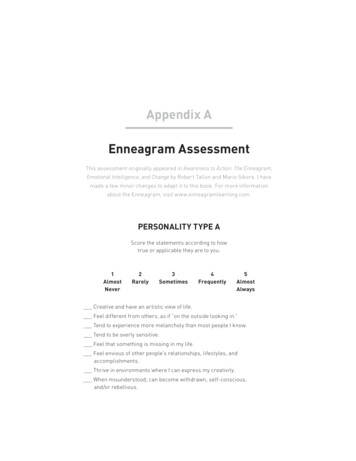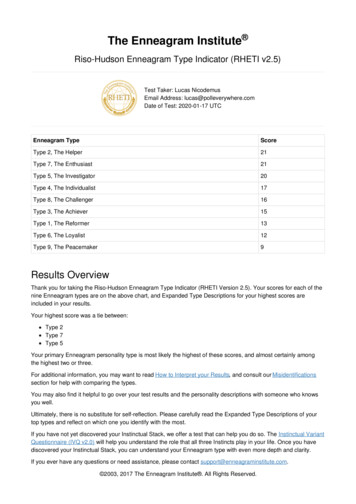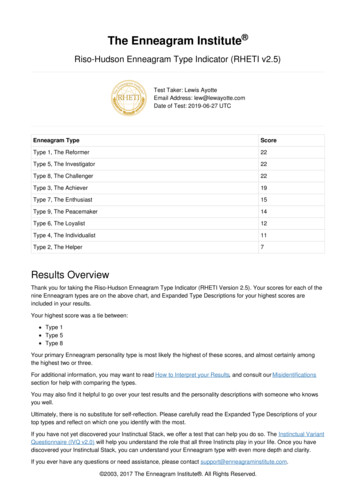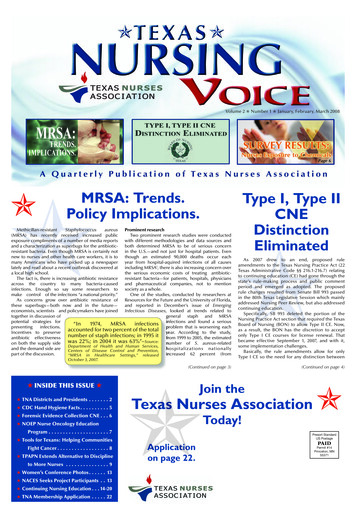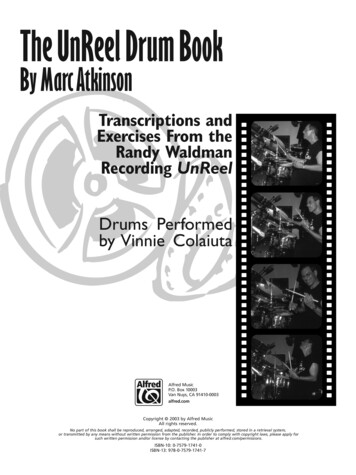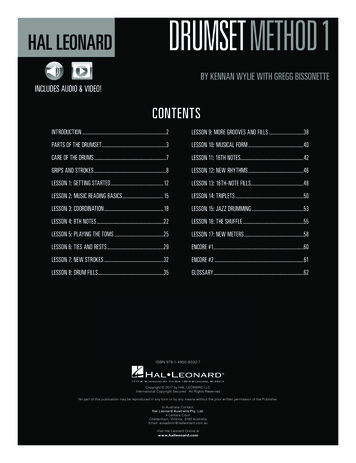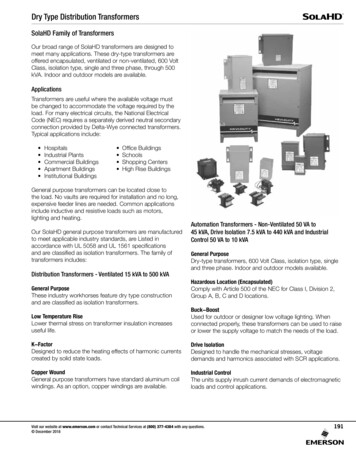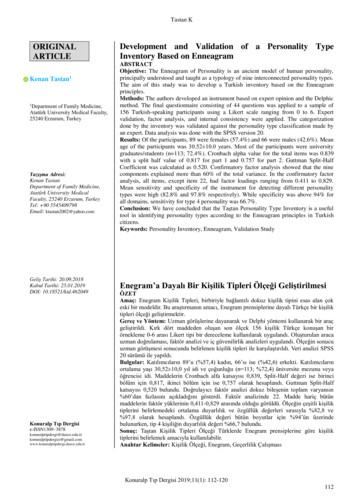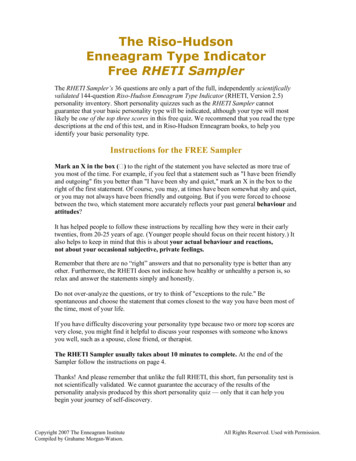
Transcription
The Riso-HudsonEnneagram Type IndicatorFree RHETI SamplerThe RHETI Sampler’s 36 questions are only a part of the full, independently scientificallyvalidated 144-question Riso-Hudson Enneagram Type Indicator (RHETI, Version 2.5)personality inventory. Short personality quizzes such as the RHETI Sampler cannotguarantee that your basic personality type will be indicated, although your type will mostlikely be one of the top three scores in this free quiz. We recommend that you read the typedescriptions at the end of this test, and in Riso-Hudson Enneagram books, to help youidentify your basic personality type.Instructions for the FREE SamplerMark an X in the box ( ) to the right of the statement you have selected as more true ofyou most of the time. For example, if you feel that a statement such as "I have been friendlyand outgoing" fits you better than "I have been shy and quiet," mark an X in the box to theright of the first statement. Of course, you may, at times have been somewhat shy and quiet,or you may not always have been friendly and outgoing. But if you were forced to choosebetween the two, which statement more accurately reflects your past general behaviour andattitudes?It has helped people to follow these instructions by recalling how they were in their earlytwenties, from 20-25 years of age. (Younger people should focus on their recent history.) Italso helps to keep in mind that this is about your actual behaviour and reactions,not about your occasional subjective, private feelings.Remember that there are no “right” answers and that no personality type is better than anyother. Furthermore, the RHETI does not indicate how healthy or unhealthy a person is, sorelax and answer the statements simply and honestly.Do not over-analyze the questions, or try to think of "exceptions to the rule." Bespontaneous and choose the statement that comes closest to the way you have been most ofthe time, most of your life.If you have difficulty discovering your personality type because two or more top scores arevery close, you might find it helpful to discuss your responses with someone who knowsyou well, such as a spouse, close friend, or therapist.The RHETI Sampler usually takes about 10 minutes to complete. At the end of theSampler follow the instructions on page 4.Thanks! And please remember that unlike the full RHETI, this short, fun personality test isnot scientifically validated. We cannot guarantee the accuracy of the results of thepersonality analysis produced by this short personality quiz — only that it can help youbegin your journey of self-discovery.Copyright 2007 The Enneagram InstituteCompiled by Grahame Morgan-Watson.All Rights Reserved. Used with Permission.
A1BCDEFGHII've been romantic and imaginative.I've been pragmatic and down to earth.2I have tended to take on confrontations.I have tended avoid confrontations.3I have typically been diplomatic, charming, and ambitious.I have typically been direct, formal, and idealistic.4I have tended to be focused and intense.I have tended to be spontaneous and fun-loving.5I have been a hospitable person and have enjoyed welcoming new friends into mylife.I have been a private person and have not mixed much with others.6Generally, it's been easy to "get a rise" out of me.Generally, it's been difficult to "get a rise" out of me.7I've been more of a "street-smart" survivor.I've been more of a "high-minded" idealist .8I have needed to show affection to people.I have preferred to maintain a certain distance with people.9When presented with a new experience, I've usually asked myself if it would beuseful to me.When presented with a new experience, I've usually asked myself if it would beenjoyable.10I have tended to focus too much on myself.I have tended to focus too much on others.11Others have depended on my insight and knowledge.Others have depended on my strength and decisiveness.12I have come across as being too unsure of myself.I have come across as being too sure of myself.13I have been more relationship-oriented than goal-oriented.I have been more goal-oriented than relationship-oriented.14I have not been able to speak up for myself very well.I have been outspoken—I've said what others wished they had the nerve to say.15It's been difficult for me to stop considering alternatives and do something definite.It's been difficult for me to take it easy and be more flexible.16I have tended to be hesitant and procrastinating.I have tended to be bold and domineering.17My reluctance to get too involved has gotten me into trouble with people.My eagerness to have people depend on me has gotten me into trouble with them.18Usually, I have been able to put my feelings aside to get the job done.Usually, I have needed to work through my feelings before I could act.Copyright 2007 The Enneagram InstituteCompiled by Grahame Morgan-Watson.All Rights Reserved. Used with Permission.
A19BCDEFGHIGenerally, I have been methodical and cautious.Generally, I have been adventurous and taken risks.20I have tended to be a supportive, giving person who enjoys the company of others.I have tended to be a serious, reserved person who likes discussing issues.21I've often felt the need to be a "pillar of strength."I've often felt the need to perform perfectly.22I've typically been interested in asking tough questions and maintaining myindependence.I've typically been interested in maintaining my stability and peace of mind.23I've been too hard-nosed and sceptical.I've been too soft-hearted and sentimental.24I've often worried that I'm missing out on something better.I've often worried that if I let down my guard, someone will take advantage of me.25My habit of being "stand-offish" has annoyed people.My habit of telling people what to do has annoyed people.26Usually, when troubles have gotten to me, I have been able to "tune them out."Usually, when troubles have gotten to me, I have treated myself to something I'veenjoyed.27I have depended upon my friends and they have known that they can depend onme.I have not depended on people; I have done things on my own.28I have tended to be detached and preoccupied.I have tended to be moody and self-absorbed.29I have liked to challenge people and "shake them up."I have liked to comfort people and calm them down.30I have generally been an outgoing, sociable person.I have generally been an earnest, self-disciplined person.31I've usually been shy about showing my abilities.I've usually liked to let people know what I can do well.32Pursuing my personal interests has been more important to me than havingcomfort and security.Having comfort and security has been more important to me than pursuing mypersonal interests.33When I've had conflict with others, I've tended to withdraw.When I've had conflict with others, I've rarely backed down.34I have given in too easily and let others push me around.I have been too uncompromising and demanding with others.35I've been appreciated for my unsinkable spirit and great sense of humour.I've been appreciated for my quiet strength and exceptional generosity.36Much of my success has been due to my talent for making a favourable impression.Much of my success has been achieved despite my lack of interest in developing"interpersonal skills."Copyright 2007 The Enneagram InstituteCompiled by Grahame Morgan-Watson.All Rights Reserved. Used with Permission.
The Riso-HudsonEnneagram Type IndicatorFree RHETI SamplerScoring InstructionsAdd the X's marked in Column A, Column B, Column C, and so forth, through Column I. Placethe number of X's you have made in the boxes below for columns A through I. If you havemarked one box in each pair of statements and have added the number of X's correctly, the sumwill be 36. If not, go back and recheck for mistakes either in counting X's or in arithmetic.Each column corresponds to a personality type, as given below. Please note that they have beenrandomized and are not in numerical iveSevenNumerical ValuesPersonality TypeDiscovering which of the nine types is your basic personality type is the object of this test. If youhave answered honestly and accurately, your basic personality type should be one of the topthree scores.To confirm your results, read the short type descriptions on the next page, and for completedescriptions in Personality Types, Wisdom of The Enneagram. or on the website atwww.EnneagramInstitute.comIf properly taken, the Riso-Hudson Enneagram Type Indicator will have accurately assessed yourbasic personality type. If the results you have obtained are unclear, please review your responsesto see if, on further reflection, you wish to change any of them.For More InformationFor a more accurate and complete assessment of your personality type, take the full RHETIonline at The Enneagram Institute website.For advanced materials about the Enneagram system, interpreting your RHETI scores, andhow to distinguish between types, please see the Riso-Hudson best-selling books — the mostcomplete and in-depth books in the Enneagram field: The Wisdom of the Enneagram,Understanding the Enneagram. and Personality TypesRecommendations for growth for each type, see Enneagram Transformations.For the RHETI in book form, see Discovering Your Personality Type which also includes a shorthistory of the Enneagram, type descriptions, and interpretative materials. For more aboutinterpreting the Functions in your full personality profile, see Discovering Your Personality Type,pp. 80ff.A complete listing of The Enneagram Institute’s books, audio tapes, printed Enneagram tests, andother Enneagram materials, can be found on their website www.EnneagramInstitute.com.Copyright 2007 The Enneagram InstituteCompiled by Grahame Morgan-Watson.All Rights Reserved. Used with Permission.
The NinePersonality Typesof the Enneagram1. The Reformer. The rational, idealistic type. Onesare conscientious and ethical, with a strong sense ofright and wrong. They are teachers, crusaders, andadvocates for change: always striving to improvethings, but afraid of making a mistake. Wellorganized, orderly, and fastidious, they try tomaintain high standards, but can slip into beingcritical and perfectionistic. They typically haveproblems with resentment and impatience. At theirBest: wise, discerning, realistic, and noble. Can bemorally heroic.2. The Helper. The caring, interpersonal type. Twosare empathetic, sincere, and warm-hearted. Theyare friendly, generous, and self-sacrificing, but canalso be sentimental, flattering, and people-pleasing.They are well-meaning and driven to be close toothers, but can slip into doing things for others inorder to be needed. They typically have problemswith possessiveness and with acknowledging theirown needs. At their Best: unselfish and altruistic,they have unconditional love for others.3. The Achiever. The success-oriented, pragmatictype. Threes are self-assured, attractive, andcharming. Ambitious, competent, and energetic, theycan also be status-conscious and highly driven foradvancement. They are diplomatic and poised, butcan also be overly concerned with their image andwhat others think of them. They typically haveproblems with workaholism and competitiveness. Attheir Best: self-accepting, authentic, everything theyseem to be—role models who inspire others.4. The Individualist. The sensitive, introspective,type. Fours are self-aware, expressive, and reserved.They are emotionally honest, creative, and personal,but can also be moody and self-conscious.Withholding themselves from others due to feelingvulnerable and defective, they can also feeldisdainful and exempt from ordinary ways of living.They typically have problems with melancholy, selfindulgence, and self-pity. At their Best: inspired andhighly creative, they are able to renew themselvesand transform their experiences.5. The Investigator. The intense, cerebral type.Fives are alert, insightful, and curious. They are ableto concentrate and focus on developing complexideas and skills. Independent, innovative, andinventive, they can also become preoccupied withtheir thoughts and imaginary constructs. Theybecome detached, yet high-strung and intense. Theytypically have problems with eccentricity, nihilism,and isolation. At their Best: visionary pioneers, oftenahead of their time, and able to see the world in anentirely new way.Copyright 2007 The Enneagram InstituteCompiled by Grahame Morgan-Watson.6. The Loyalist. The committed, security-orientedtype. Sixes are reliable, hard-working, responsible,and trustworthy. Excellent “trouble-shooters,” theyforesee problems and foster cooperation, but canalso become defensive, evasive, and anxious—running on stress while complaining about it. Theycan be cautious and indecisive, but also reactive,defiant and rebellious. They typically have problemswith self-doubt and suspicion. At their Best:internally stable and self-reliant, courageouslychampioning themselves and others.7. The Enthusiast. The busy, variety-seeking type.Sevens are extroverted, optimistic, versatile, andspontaneous. Playful, high-spirited, and practical,they can also misapply their many talents, becomingover-extended, scattered, and undisciplined. Theyconstantly seek new and exciting experiences, butcan become distracted and exhausted by staying onthe go. They typically have problems with impatienceand impulsiveness. At their Best: they focus theirtalents on worthwhile goals, becoming appreciative,joyous, and satisfied.8. The Challenger. The powerful, dominating type.Eights are self-confident, strong, and assertive.Protective, resourceful, straight-talking, anddecisive, but can also be egocentric anddomineering. Eights feel they must control theirenvironment, especially people, sometimesbecoming confrontational and intimidating. Eightstypically have problems with their tempers and withallowing themselves to be vulnerable. At their Best:self-mastering, they use their strength to improveothers' lives, becoming her
The RHETI Sampler usually takes about 10 minutes to complete. At the end of the Sampler follow the instructions on page 4. Thanks! And please remember that unlike the full RHETI, this short, fun personality test is not scientifically validated. We cannot guarantee the accuracy of the results of the
